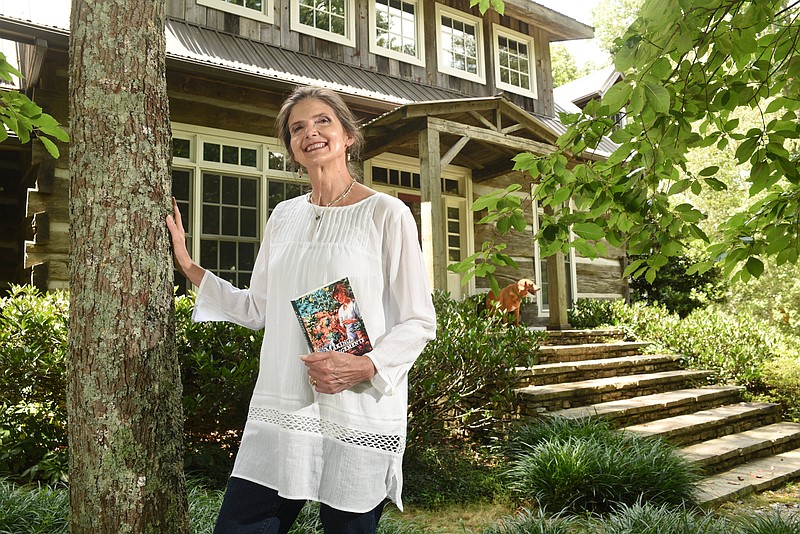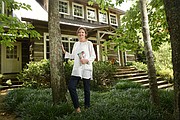Photo Gallery
Plotting for Publication: Would-be authors have several ways to get published these days
Ferris Robinson's day job is editing The Mirror, Lookout Mountain's monthly newspaper, but she loves coming home to her favorite armchair, making room for her dog and a laptop - and writing her own books.
In 2007, a niche publisher, Schiffer, paid her to write "Authentic Log Homes: Restored Timbers for Today's Homesteads," a book that showcased 17 log homes built by her husband. Her next book, "The Gorgeless Gourmet's Cookbook: Practically Fat-Free Recipes for Super-Busy People" was printed by Georgia's Peachtree Press, a publisher hailed by Georgia Trend magazine for grooming authors who are eventually wooed by heavy-hitters like Random House.
She hasn't become wealthy from these ventures but "I get a check occasionally in the double digits," she says with a lighthearted laugh.
Then a friend told her about the Kindle Scout contest, which has been going on for about two years. Competition is fierce with hundreds of authors submitting manuscripts and only 100 chosen this year to be published and sold on Kindle and Amazon, which owns Kindle. Winners get a $1,500 advance, a five-year renewable contract, film and foreign language rights and a 50/50 split of eBook royalties between the author and Amazon.
Robinson entered her newly completed novel, "Making Arrangements." The heroine, cancer survivor Lang Eldridge, mourns her beloved husband who dies playing tennis and leaves behind secrets that can ruin his widow's life. The plot combines mystery and family power plays as Eldridge deals with a pushy daughter and adorable granddaughter.
While Robinson was thrilled when her book was chosen this summer, she was even happier on the day "Making Arrangements" landed right behind Pulitzer Prize winner Rick Bragg's "My Southern Journey" in sales.
"I took a screenshot," she says.
But it wasn't all fun. Robinson is a soft-spoken, slender woman with a manner so upbeat it's surprising to hear her say wryly, "Honestly, if I had known how much work the formatting and design would be, I probably never would have entered the contest."
Pros & cons
These days, would-be authors have several outlets for their works - eBooks. Self-publishing. Traditional publishing. Digital or hard copy.
The popularity of eBooks and self-published works - which can be digital or hard copy - is growing in significant numbers, according to Pew Research. In 2009, according to Publishers Weekly, more self-published books were produced than traditional ones. In 2014, 28 percent of adults had read an eBook, compared to 23 percent in 2013, Pew reported, an increase attributed to the growing popularity of eBook readers and tablets.
There's also growth in the self-publishing of hardbound books. According to R.R. Bowker, a consultant firm for publishers, authors and retailers, there was 292 percent growth from 2008 to 2013 in self-publishers applying for an International Standard Book Number, or ISBN, which is required to publish and distribute a book through booksellers.
But each method has pros and cons.
Self-published and eBooks have something of a stigma since most have not been vetted by a literary agent, the first person to say whether a book is good enough to find a publisher, or by a traditional editor at a publishing house. Some magazines, newspapers and other outlets won't review self-published works, making it difficult to get traction with publicity.
In the part of the industry known as "vanity press," authors must pay a publisher to print the book, which can run several thousand dollars. Along with a cut of royalties, the publisher also may charge extra for such steps as designing cover art, formatting the type for publication in hardbound copies and getting the book out to retailers.
In eBooks and self-publishing, the author usually gets a higher royalty rate on each book sold than traditional but, since the rate is set on the cover price of the book - as low as $2.99 on eBooks - there may not be a lot of money coming in unless they sell a ton of books. And that tends to be somewhat rare.
In traditional publishing, an author usually starts by finding a literary agent who tries to sell the book to a publishing house. Since agents make their money off a cut of a book's sales, they don't want to waste their energy pitching something no publisher wants. As a protection against taking time to read manuscripts that are terrible, some publishers won't even look at a book unless it comes through an agent.
Once a publisher decides to buy a book, it pays the author with an advance check against future royalties; the agent gets a cut. The publisher takes care of editing the book, creating the cover, handling the printing and the distribution and - in what some say is the most important step - designing a publicity campaign.
When the book is released, the author earns royalties from sales, but initial royalties are used to repay the amount of the advance. Once that is paid off, the author will receive the total percentage of royalties agreed to the contract. The agent gets a cut of those, too.
But an agent also may try to sell the book rights in other countries, and each country means a new contract, advance and royalty rate. And the agent may pitch the book to TV and movies, which means more money if successful.
On the downside, yes, some of the royalties earned will go to the agent and to pay back the advance - and paying back the advance can take months or years, and sometimes doesn't happen at all if sales are low.
In some cases, unless the writer is a bestselling author with some clout, the publishing company may make only a token effort when it comes to publicity. And such elements as the final design of cover art may also be out of a new author's hands.
There also may be significant lag time between when a book is sold and actually released - 18 months to two years is not unusual. In eBooks, publication can be almost instantaneous, while self-publishing of hard copies takes longer but not as long as traditional.
Changing times
Still, those in the industry say having multiple options is an advantage for some writers.
"These days, writers don't have to choose between one or the other," says Chattanooga-based author Cherie Priest, who has written 20 books, including the bestselling and critically praised steampunk novel "Boneshaker" and its sequels. "Plenty of authors both publish traditionally and self-produce their own material, and many find real success with this hybrid model."
Priest, whose next novel, the ghost story "The Family Plot," is scheduled for release in September, has stuck with traditional publishing throughout her 15-year writing career. But there are some writers for whom self-publishing is a good idea, she says.
"Self-publishing tends to work best for two specific kinds of writers: people with a traditional publishing platform to start from or those who have other publishing industry experience," she says. "Obviously there are exceptions.
"Self-publishing can be great for niche topics, authors with a built-in fan base (usually via the internet), and also for genres with enthusiastic, high-volume readers such as romance and erotica. And sometimes, a self-published story will take off out of the blue and become a big hit. It happens in traditional publishing, too. You just never know."
Before investing money in any kind of publishing, Priest says, a writer should make a candid assessment of how much energy and organizational skill he or she actually has, in addition to writing talent.
"When you self-publish, you have to wear a lot of hats - or pay people to wear those hats for you," Priest says. "You manage your own editorial and formatting, artwork, publicity, distribution and any number of other services that a publisher generally handles so that the author doesn't have to.
"And for some people, that's great. If you excel at these things and enjoy having control over the whole process from start to finish, self-publishing may be the path for you. If - like me - you are lazy and disinterested in these things, then a more traditional publishing path might be more your speed."
All the work in self-publishing is fun for Blair Howard from Cleveland, Tenn., who says he earns far more self-publishing his series of novels about Signal Mountain private eye Harry Starke than he ever did annually as a newspaper journalist or managing a website for The New York Times. The series began in September 2015 with "Harry Starke" and has now stretched to six books with the latest, "Gone."
"I have fun every day. I love the writing and the work," Howard says.
"All the characters are completely imaginary but all the Chattanooga streets, buildings, restaurants and sites in my books are real," he says. "The research is fascinating. I hang out with local police officers a lot. The good people at a nonprofit called Second Life helped me learn about human trafficking, which played a big part in one book's plot."
Howard estimates that he writes six to eight hours daily and spends about four hours daily on marketing through Facebook ads, his website and email. He warns that if you aren't good at pitching your work to strangers, self-publishing is not for you.
"There are at least 3.5 million books to choose from on Amazon; no one will find you if you don't know how to market your books," Howard says. "I do."
Kindle contest
For the Kindle contest that Robinson entered, no one from Kindle responded to requests for comment, but the contest guidelines make it clear that wanna-be authors must supply more than a great story.
Each entrant must submit a social-media marketing campaign in order to get people to nominate her book for publication. Robinson sent email blasts promising a caramel cake recipe mentioned in the book to those who nominated her.
"I asked Facebook friends and Twitter followers to nominate me," she says.
To enter the contest, a manuscript with page breaks and chapter headers must be formatted to Kindle specs. Robinson found the tasks so labor intensive, she hired freelance designers to format the manuscript and create an online promotional site.
Authors also must supply their own cover art. Robinson's mom is an artist and she donated a painting of a pensive blonde in a lemon grove for the cover.
And even now as a contest winner, the work doesn't stop.
"I write my own press releases," she says. "If I want to do a bookstore reading, I contact the stores myself."
Contact Lynda Edwards at 423-757-6391 or ledwards@timesfreepress.com.

